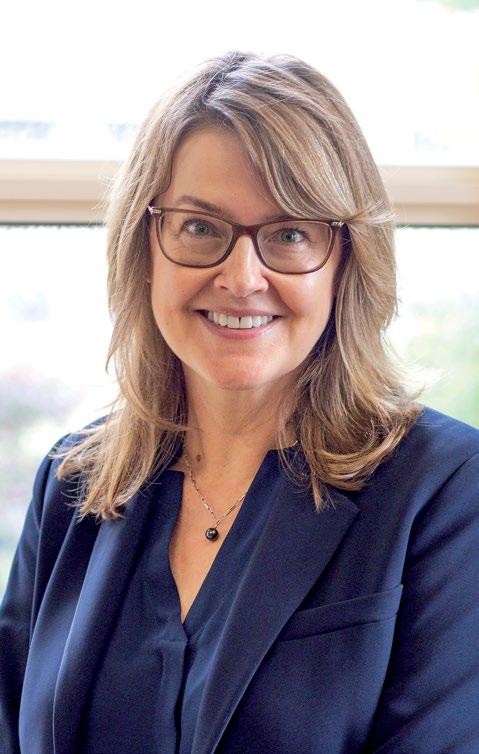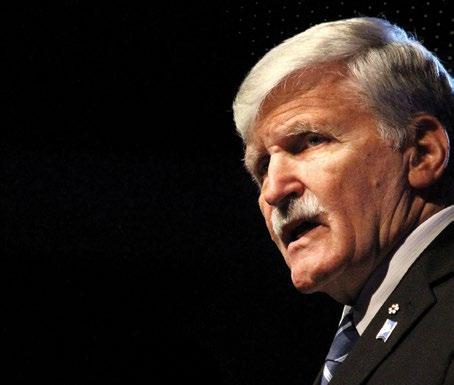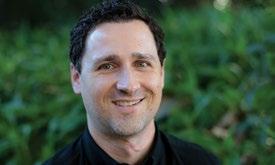Rehabilitation Medicine





This year donors gave $3,003,715 to the Faculty of Rehabilitation Medicine through gifts, grants, sponsorships, pledges and bequests. Your generosity changes lives through education and rehabilitation!

Editor: Amie Filkow
Copyediting: Sasha Roeder Mah, Shirley Wilfong-Pritchard Writing: Bev Betkowski, Michael Brown, Amie Filkow, Nate Lam, Adrianna MacPherson, Geoff McMaster, Ryan O’Byrne, Jon Pullin, Sasha Roeder Mah, Shirley Wilfong-Pritchard Design: University of Alberta Photography: University of Alberta, iStock, other photos supplied Faculty of Rehabilitation Medicine 3-48 Corbett Hall 8205 114 Street NW University of Alberta Edmonton, Alberta, Canada T6G 2G4 T: 780.492.9403 F: 780.492.1626 E: frmcomms@ualberta.ca
Rehab Impact is published annually by the Faculty of Rehabilitation Medicine at the University of Alberta. It is distributed worldwide to more than 8,000 alumni, universities, government bodies, organizations and friends of the Faculty.
The University of Alberta and the Faculty of Rehabilitation Medicine are primarily located on the traditional territory of Cree, Blackfoot, Métis, Nakota Sioux, Iroquois, Dene, and Ojibway/ Saulteaux/Anishinaabe nations; lands that are now known as part of Treaties 6, 7, and 8 and homeland of the Métis. The University of Alberta respects the sovereignty, lands, histories, languages, knowledge systems, and cultures of First Nations, Métis and Inuit nations.

Rehabilitation medicine has its roots in helping people recover after war or epidemic, and from the beginning of the COVID-19 pandemic, the Faculty of Rehabilitation Medicine was there to help — from bringing virtual health care across the province with telehealth technologies, to providing coping strategies to keep families and communities healthy and well.

As the world gradually emerges from the challenges of the past few years, our Faculty’s team-based approach to research, teaching and community partnerships will allow us to take a leading role in this period of post-pandemic recovery. And as a faculty within the newly created College of Health Sciences, I see incredible opportunities for collaborative research and interdisciplinary teaching, leading to improved clinical care and service to Albertans.
Recently we celebrated our MSc and PhD students at convocation in person for the first time since 2019; we recognized our outstanding faculty, academic teaching staff and clinical educators/preceptors at our annual teaching awards celebration; and we held our research colloquy and research day focused on the ground-breaking research being conducted by our graduate students and faculty members. I was excited to hear about current and future directions in our areas of excellence: Brain and Mind, Living Well, and Early Years. I hope you will enjoy reading about some of this important work in this issue of Rehab Impact.
Of course, none of these achievements would be possible without the ongoing support of our alumni and donors. Thank you for mentoring students, donating invaluable funding and strengthening our connections by sharing your experiences. A special thank you to our alumni preceptors who continued
to take on clinical placement students despite the challenges of the pandemic. We are grateful for your partnership — without it, we would not be able to do what we do.
I am excited about the future of rehabilitation. With the release of the University of Alberta’s Indigenous Strategic Plan, Braiding Past, Present and Future, and the Faculty of Rehabilitation Medicine’s renewed commitment to reconciliation, we are on a journey to centre our academic efforts on equity, diversity, inclusivity and accessibility. It’s a journey we will take together, with you as partners.
On that note, I want to hear from you! Please reach out anytime. If you have any questions, concerns, or just want to chat, email me at thopper@ualberta.ca.
Sincerely,
Tammy Hopper, PhD, R-SLP, CCC-SLP Professor and Dean, Faculty of Rehabilitation MedicineHer Honour, the Honourable Salma Lakhani, Lieutenant Governor of Alberta became an Honorary Patron for the Institute for Stuttering Treatment and Research (ISTAR). Her invaluable support will help ensure every voice matters.


joined five other faculties to form the new College of Health Sciences, where exciting new opportunities abound for interdisciplinary teaching, research and service to our community.

Dr. Tammy Hopper was named dean of the Faculty of Rehabilitation Medicine for a five-year term effective July 1, 2022.

Viewers from 30 countries watched as our Heroes in Mind, Advocacy and Research Consortium (HiMARC) brought Lt. Gen. (ret) Roméo Dallaire and world experts together in a series of virtual conversations about leadership, moral courage and moral dilemma during times of conflict and crisis.


Through the Intersections of Rehabilitation series, experts explored health outcomes and experiences in populations who are marginalized through the lens of critical race theory.

The Faculty of Rehabilitation Medicine leads cutting-edge research in neuroscience and mental health, children’s health and wellness, and the prevention and management of chronic conditions to help improve people’s quality of life.
total research revenue in the last year for the Faculty of Rehabilitation Medicine
On the next few pages check out our research highlights from 2021-22 peer-reviewed research publications

“Students are ‘insiders’ who know their culture, needs and concerns. Compared to researchers (like me) — who are ‘outsiders’ — students are better positioned to develop action-based interventions that address their needs.”
Shu-Ping Chen, Associate Professor, Department of Occupational Therapy
Why is destigmatization so key in tackling mental health issues?
Stigma can cause more devastating consequences than health conditions do, damaging a person’s selfesteem, imposing additional stress and preventing them from calling for help and seeking care. The more we destigmatize mental health concerns and substance misuse, the more inclusive our communities will be, reducing stresses on those who need help and clearing a path for support. I’ve seen this in my own life: Destigmatizing mental health has allowed my own children to feel safe talking about their issues with me and empowers me to help them.
What part of your research focuses on students?
My current research focuses on students’ excessive drinking, substance misuse and mental health. I use empowerment-based health promotion and a participatory approach, which allow students as co-researchers to determine their own actions to improve their personal and community health.
Why is participatory research so effective?
On campuses, we give students the opportunity to name their issues using their own language and understanding, discuss possible actions and take those actions. Students are “insiders” who know their culture, needs and concerns. Compared to researchers (like
me) — who are “outsiders” — students are better positioned to develop action-based interventions that address their needs. What kind of participatory action research have you done with students?
My team has carried out student-led initiatives to address socially constructed perceptions about gender that promote alcohol misuse on campus. Student coresearchers identified gender norms that matter to them and developed relevant, gender-specific, culturally sound interventions. We also led a participatory video project involving student co-researchers from five universities who developed a documentary about mental health concerns on campus.
How might that recent research impact the future of student mental health?
We are proposing a national project to empower students across five universities — including the U of A — to build an Inter-Campus Virtual Community of Practice (iCoPe), to foster resilience and promote student mental health. Student co-researchers from each campus will design and implement health-promotion activities. This virtual platform will foster a safe and creative space where students can collaborate to create solutions to common health-promotion problems and issues on their campuses.
Shu-Ping Chen’s research stems from a place of hope — propelled by the belief that people with mental health concerns or substance misuse can find health and happiness. Using participatory research methods, her goal is to change public attitudes towards marginalized groups and to increase their sense of social inclusion.
Assistant professor Tim Barlott, ’08 BSc(OT), ’13 MSc, has worked as an occupational therapist, addictions counsellor, youth worker, educator and participatory researcher. His current research focuses on the power of mental health allyship and how fostering freely given friendships between people can be a valuable community-oriented alternative in the mental health sector. “I hope to advance non-institutional and community-based approaches that give people space to thrive as citizens in society,” he says.



Victor Ezeugwu, ’18 PhD, joined the faculty as an assistant professor on July 1, 2022. His research has looked at behaviour change and ecological approaches to optimize healthy movement behaviours across the lifespan — from children to older adults with limited mobility. His new research focuses on biomarkers, physical- and social-environment correlates and determinants of movement behaviours in people with neurological and cognitive impairments, especially the relationships between sleep, sedentary behaviour, physical activity and health.
Get to know some of our newest faculty members
Keith Fenrich, ’03 BSc Pharm, completed a postdoctoral fellowship at the U of A in 2017 and has been a faculty member ever since, now an assistant professor. Fenrich’s research looks at how neurons respond to injury, particularly in the spinal cord. His second love is creating new tools to support that research, which, as he says, involves “taking small ideas for new tools and developing them into something that’s really useful for a large number of researchers.”
Now more than ever, rehabilitation is essential to enhancing lives.
When you name the University of Alberta’s Faculty of Rehabilitation Medicine in your estate plans, you make world-changing research and the education of future generations of rehabilitation professionals possible.
Whether your legacy will be helping students succeed, being part of game-changing research, or advancing innovation and state-of-the-art technology, the Faculty
of Rehabilitation Medicine has an area to which you can direct your support. Unlike a gift given now, a planned gift allows you to invest in an area that matters to you without affecting your current financial resources. A legacy gift can even allow you to make a much larger gift and help minimize taxes for your estate.

Choose your passion area to make the greatest impact. Your generosity will ensure a lasting legacy.
To learn more about planned giving or to arrange a bequest, please contact John Voyer, Assistant Dean, Development.
780-248-5781
john.voyer@ualberta.ca
Long

Physical therapy researchers explore rehabilitation needs and access to services for people living with long COVID.
developing bioengineered ‘bridge’ to help heal spinal cord injuries

With a $24M New Frontiers in Research grant, rehabilitation researchers are part of an international project to explore regrowing damaged nerve fibres.
Tools that aren’t adapted to diverse cultures or languages make it a challenge to identify which children could benefit from early intervention, say communication sciences and disorders researchers.

COVID: ‘Is this going to be my new normal?’
developmental screening tools needed to ensure children have proper support
Our Assistive Technology Lab wins innovation challenge for Think2Switch, a braincomputer interface that lets kids with limited mobility power toys or wheelchairs with their mind.

Grief over death of animal companions needs to be taken more seriously
Occupational therapy research highlights the effects on well-being and the need for better support for pet-bereaved individuals.

on your thinking cap: Mild electrical stimulation could boost cognitive ability

Research in communication sciences and disorders explores new treatments for people looking for cognitive improvement.
Go online to read the full stories! ualberta.ca/rehabilitation
The future is bright for learners in the Faculty of Rehabilitation Medicine. With career paths in speech language pathology, physical therapy, occupational therapy and rehabilitation science, our students go forward anchored by a community of dedicated instructors. Thank you to all our educators in the classroom and in the clinic who went above and beyond their regular teaching practices to ensure our students received the best educational experience possible — even in the middle of a global pandemic.
“How do we set the foundation for amazing learning opportunities? I think it’s simple: We all do better when we feel safe, cared for, and when we believe that we’re working toward something meaningful. And aren’t these exactly the same things we hope students ultimately do for their patients?”
- Judy Chepeha, MScPT, PhDAssociate Teaching Professor, Faculty of Rehabilitation Medicine

Teaching award winner and keynote speaker, Rehab Med Teaching Awards Celebration 2022

Every day at work, Emilie Lefebvre, ’21 MScSLP, honours her francophone roots and her desire to help people, supporting French-speaking children with speech-related challenges. A certificate in francophone practice for speech-language pathologists — offered jointly by the Faculty of Rehabilitation Medicine and Campus Saint-Jean — helped prepare Lefebvre for her busy and fulfilling practice in southern Alberta. “It feels like … coming home, to have an impact in the community I grew up in,” she says.



Juanita Gnanapragasam, ’19 MPH, ’22
MScOT, finds joy in designing wellness programs for her clients based on what matters most to them. In many cases in her experience, that has revolved around food and cooking. Food is the foundation upon which she helps to build the connections and community so vital to wellness — from studying cultural sustainability through food to leading cooking classes for youth recovering from mental illness.
For Rachel Stokes, ’22 MScRS(PT), the field of physical therapy is the ideal fit: It combines her love of anatomy and physiology, and allows her to use her strong communication skills, critical thinking and love of teamwork. “Every day is a challenge, but it’s so exciting and rewarding to know that I’m helping people create positive change in their lives and regain their independence,” she says.
Our Master of Science in Occupational Therapy (MScOT) program was granted an accreditation award of seven years from 2022 to 2029 from the Canadian Association of Occupational Therapists (CAOT).
of invaluable hands-on learning to our students. THANK YOU!Meet some of our amazing new graduates!

♦
A joint initiative between the Faculty and Campus Saint-Jean, the certificate in Francophone Practice for SLPs empowers practitioners to work closely with dual-language francophone populations in Alberta and other areas where French is a minority language.
♦ Professionals pursuing a Health certificate will learn to address the common challenges associated with comprehensive sexual health education, with special focus on understanding personal bias with respect to different cultures, lifestyles and values.
♦
Geared toward professionals in a broad range of settings, the Pain Management certificate teaches methods for effective, evidence-based assessment and treatment of pain conditions.
♦ Internationally trained physiotherapists can learn what they need to enter the profession here in Canada through the Bridging to Canadian Physical Therapy Practice certificate.
♦
The microcredential in Diagnostic Imaging for MSK Disorders builds knowledge and clinical-decision making skills required to effectively utilize conventional radiography, CT scan, MRI and diagnostic ultrasound.


people participated in a Continuing Professional Education course or program in 2021-22
For more information on our professional development programs, visit uab.ca/pd
Our community-based and student-run clinics provide rehabilitation services to patients from the surrounding community and beyond, giving students hands-on clinical experience. Across our clinics, programs and research, we work to support communities facing barriers to access, including military members and veterans, rural residents, Indigenous communities and Edmonton’s underserved populations.
Corbett Hall Speech-Language Clinic (Corbett Clinic)
Corbett Hall Early Education Program (CHEEP)
Corbett Hall Student Physical Therapy Clinic
Institute for Stuttering Treatment and Research (ISTAR)
Cancer Rehabilitation Clinic / Alberta Cancer Exercise Program
Alberta Aphasia Camp
Augmentative and Alternative Communication Camp
Corbett Aphasia Rehabilitation and Education (CARE)
Parkinson: Ability, Communication, Education (PACE)
The Tele-Rehab 2.0 project continues to innovate ways to bring rehabilitation to rural residents who may face barriers to specialized care. This year the team received an AGEWELL grant to develop virtual falling-risk assessments in seniors’ facilities. Tele-Rehab’s partnership with Alberta Health Services is also seeing ongoing success, with 10 new AHS sites onboarded in the past year.



The Government of Albertafunded Military- and VeteranFriendly Campus pilot project, co-led by our Heroes in Mind Advocacy and Research Consortium (HiMARC), has been busy creating a toolkit for other universities and colleges to become military and veteran friendly, and launching a virtual hub and physical resource centre for military and veteran students with space for programming, support and mentoring.
Created to meet community needs during the pandemic, our virtual aphasia clinic program, CARE, this year served more than 30 individuals living with aphasia throughout Alberta and Saskatchewan. CARE complements our annual Alberta Aphasia Camp, a weekend retreat with recreational and therapeutic activities located at Gull Lake.
Celebrating our alumni and donors
Congratulations! Two members of our Rehab Med family received 2021 U of A Alumni Honour Awards:
Linda Jean MacDonald, ’88 BSc(PT), ’94 BA, is a passionate advocate for Canadians living with myalgic encephalomyelitis (formerly chronic fatigue syndrome) and her efforts have led to greater understanding of the disease in the medical field and among the public.
John Ramsey, ‘62 BSc(ChemEng) — a longtime member of the Faculty of Rehabilitation Medicine dean’s advisory council — has dedicated decades to organizations supporting education, health, community sports and more.

We are excited to be able to meet again in person and look forward to seeing you at U of A Days (Alumni Weekend) this fall! In the meantime, we’d love to hear from you. Send us an email at frmcomms@ualberta.ca or submit a class note at ualberta.ca/rehabilitation/alumni.

Gifts to ISTAR reduce financial barriers to stuttering treatment for individuals like John Carnegie, whose life was transformed when he overcame a lifelong struggle with stuttering after attending a threeweek intensive program at ISTAR. Moved by his experience, he became a donor to help others.
Entirely donor supported, the CCCAP fund helps

access speech and language therapy at Corbett Clinic. The fund subsidizes up to 50 per cent of the cost of service depending on the financial need of the client.
Spurred on by a generous challenge gift from alumnus Mark Cho — who remembers having to rely on scholarships and bursaries as a student — 45 donors contributed to the U of A’s Giving Day. Donations will support emergency bursaries for rehabilitation medicine students in financial need.

If your Rehab Med class is celebrating a milestone anniversary this year (25th, 30th, 40th, 50th or 60th) we’d love to help you organize a reunion with your classmates! For more information on becoming a class organizer, please contact frmcomms@ualberta.ca












